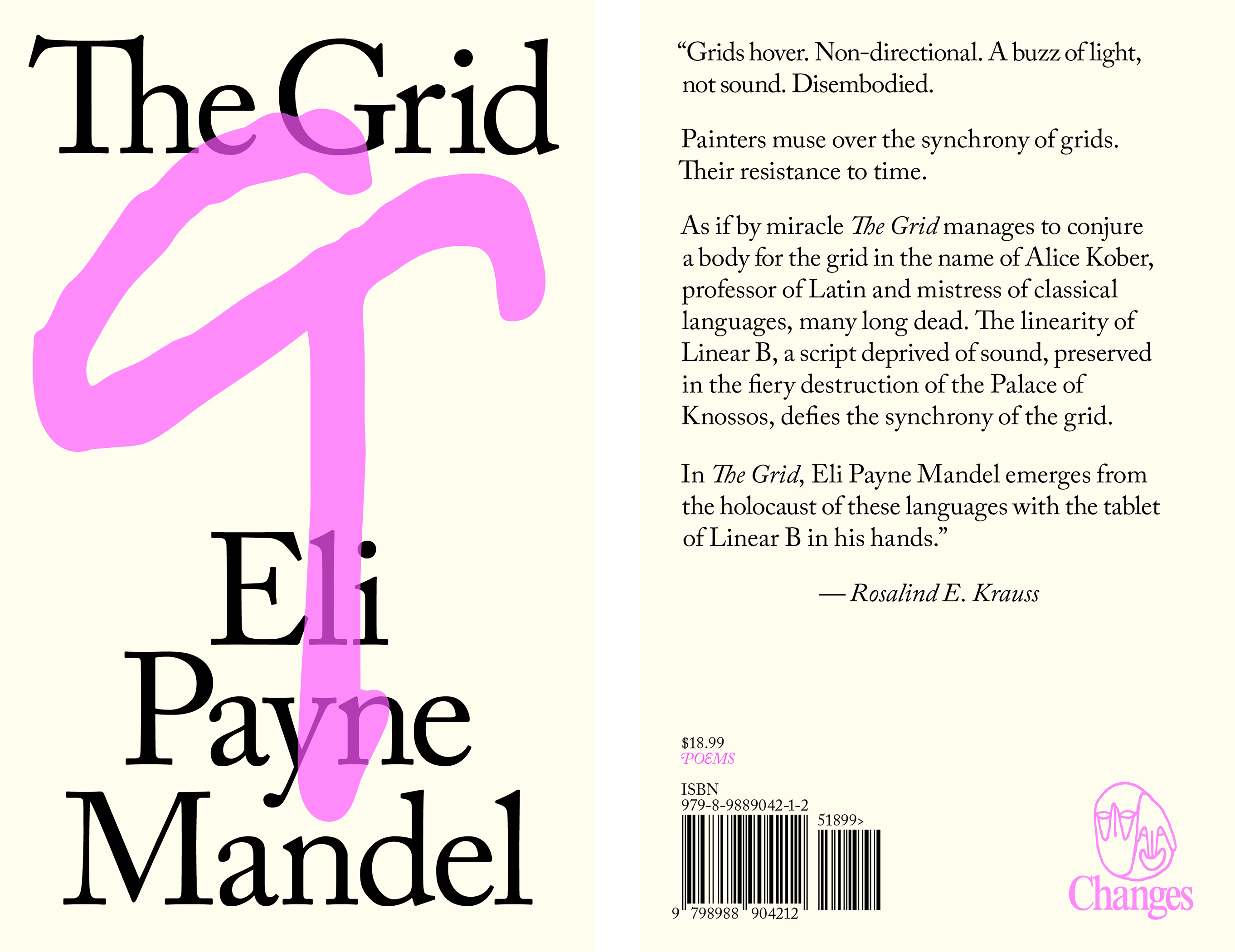The Grid


The Grid
By Eli Payne Mandel
Publication date: Nov 1, 2023
ISBN# 979-8-9889042-1-2
5.5 x 8.5" 96pp Paperback
$18.99
The Grid is about the end of worlds, ancient and modern. In three sequences of poems interspersed with Mandel’s own translations from classical texts, figures of obsession and loneliness try to decrypt what Maurice Blanchot called ‘the writing of the disaster’. Like a detective novel, the title sequence pieces together archival fragments into a lyric essay about Alice Kober, the half-forgotten scholar behind the decipherment of the ancient writing system called Linear B.
Across different wartimes, Mandel adapts the typography and formatting of archived papers, their overlaps and errors and aporias, yielding a collection of what, though sometimes written as prose, turn out to be poems. From Ovid’s bitter letters of exile to the prime minister’s letters of instruction to nuclear submarine captains, The Grid tells a series of stories about four thousand years of apocalypse. Strange, humane, and deeply rooted in the ancient world, Mandel’s first book surveys the ruins of the West with no nostalgia.
Eli Payne Mandel is a poet and psychoanalyst in training. He studied English literature at Yale and Princeton, and has lived most of his life in Brooklyn, New York. His poetry and essays have appeared or are forthcoming in PN Review, New Poetries IX, Raritan, The Harvard Review, Ploughshares Solos, The New Inquiry, and elsewhere. The Grid is his first book.
Praise for The Grid
★ Named Poetry Book of the Month by The Telegraph ★
“Eli Mandel’s The Grid is a thriller with a scholar at the center – a story of Western Culture’s rise and demise begun in vivid curiosity and finished in painful precision. Told in prose and lyric fragments, the collection takes the shape of a series of hints and guesses, restraining and revealing the dark matter of patriarchy and power that classical literature carries with its versions, mistakes, and translations.
The first section follows the classicist Alice Kober, whose now-invisible discovery of the pattern behind the Greek we’ve learned to translate haunts the scholarly record with an unexpected sensuousness: ‘Her vast grids are a science of graphics, a way of writing-knowing that trawls blank waters streaked with stars.’ In this story, and the poems and ‘letters’ that follow, Mandel reminds us, again and again, of the erotic quality of knowing, one that eschews worldly result in favor of a kind of pure energy, a life force more alive than productive, and more ferocious than useful: ‘So my heart is eaten without end.’
The Grid is no mere footnote to the classics – in this work, Mandel changes the shape of the American narrative poem forever.”
—Katie Peterson, author of A Piece of Good News
◇
“Grids hover. Non-directional. A buzz of light, not sound. Disembodied.
Painters muse over the synchrony of grids. Their resistance to time.
As if by miracle The Grid manages to conjure a body for the grid in the name of Alice Kober, professor of Latin and mistress of classical languages, many long dead. The linearity of Linear B, a script deprived of sound, preserved in the fiery destruction of the Palace of Knossos, defies the synchrony of the grid.
In The Grid, Eli Payne Mandel emerges from the holocaust of these languages with the tablet of Linear B in his hands.”
—Rosalind E. Krauss, author of The Originality of the Avant-Garde and Other Modernist Myths
◇
“A book about reading the unreadable, and seeking meaning where it can’t be found, The Grid resists neat conclusions and hyperbole in a way that feels true to its subject. […] The deadpan, dreamlike prose-poems – surreal-ish if not surrealist – reminded me of Ian Seed, and of Kafka’s short fables.”
—Tristram Fane Saunders, The Telegraph



